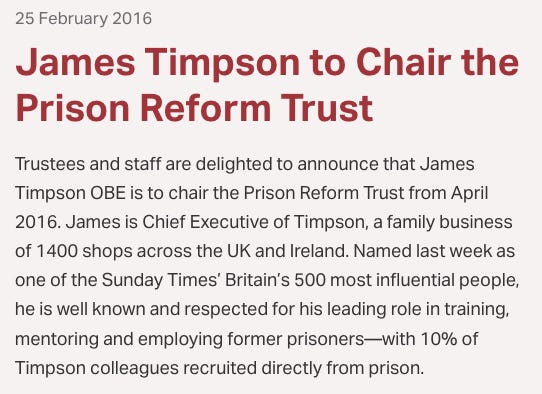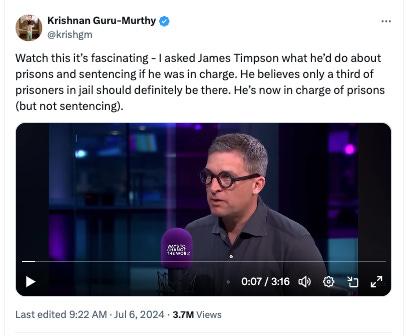The task before James Timpson
The significance of this welcome appointment - and two of the obstacles that he needs to overcome
The appointment of James Timpson as prisons minister is welcome - indeed it is the most welcome appointment to this position that any sensible person can imagine.
But there are a couple of serious obstacles that he will need to overcome.
*
Before those two obstacles are described, however, let us remind ourselves of the Tale of Two Timpsons, for it perhaps tells us something significant about what is now our governing party.
When Edward Timpson - the younger brother of James - was selected as a candidate by the Connservative Party in 2008, this was the infantile response of the Labour Party:
Edward Timpson himself referred to this dreadful, crass campaign in an interview in May this year when he announced he was standing down from parliament:
*
So one thing the appointment this week maybe signifies is that the now governing party is rather more politically mature.
*
And the appointment also signifies a more mature approach to prisons policy.
(We can only hope that one day there is a similarly mature appointment in respect of drugs policy.)
James Timpson has an outstanding record in respect of rehabilitation of offenders, both at his Timpson business and otherwise.
He is, for example, chair of the Prison Reform Trust:
A post he wrote on appointment is worth reading here.
*
"We’re addicted to sentencing, we’re addicted to punishment," he has said more recently.
"So many of the people in prison in my view shouldn’t be there. A lot should but a lot shouldn’t, and they’re there for far too long."
This is therefore a sensible and enlightened appointment which deserves hearty applause.
*
But.
Timpson has (at least) two obstacles in his new position - and it cannot be certain that he can overcome them.
*
The first obstacle is that the track record of business people appointed as ministers indicates that they tend not to be successful as politicians.
There was John Davies under then Prime Minister Edward Heath, and he was not a conspicuous success.
There was David Young under then Prime Minister Margaret Thatcher who, despite been adept at telling her what she wanted to hear (“Other people bring me problems; David brings me solutions,” she is quoted as saying), was otherwise not a conspicuous success.
There was Archie Norman under then Leader of the Opposition William Hague, and he was not a conspicuous success (“I was the first FTSE-100 chairman to sit in the House of Commons and I will almost certainly be the last,” he said afterwards).
And there was Digby Jones under then Prime Minister Gordon Brown, who was also not a conspicuous success.
One reason for none of these business people being successful as politicians is that being good at business does not automatically mean that one will be good at politics.
Being good at politics requires specific skills - and there is no particular reason why a business person will have those skills.
That said, James Timpson is more than just a good businessman, he is a committed and knowledgable prison reformer - and this may make the difference where other business people have failed as front bench politicians.
But the reason this really matters in this instance is because of the second obstacle.
*
The second obstacle to James Timpson being successful as prisons minister is the structurally and politically weak position of being a mere minister of state in the Ministry of Justice - both against the Treasury and in respect of the news media.
*
Since 2005 prisons have been under the Ministry of Justice, having been moved over from the Home Office.
To an extent this was a good thing, for the less power the Home Office has over anything, the better.
But it was also a bad thing, for the it turned the Ministry of Justice from what was the old Lord Chancellor’s Department into a “spending” department.
And not only a spending department, but a small spending department - the worst of both possible worlds.
Part of the problem the Ministry of Justice has had since 2005 - under all administrations - is its weak position vis-a-vis the Treasury.
At least the Home Office had some departmental heft and a senior cabinet presence in its battles for public money; the Ministry of Justice almost has none.
And Timpson will not even be head of this department - the Lord Chancellor and Secretary of State for Justice is Shabana Mahmood (another welcome appointment).
Mahmood in turn will be fighting for money for the courts system and legal aid, as well as for probation and prisons. This puts Timpson further back in the queue for public money - to the extent any changes he wants to bring about requires investment.
*
And it will not only be the Treasury that will be need to be won over.
The right-of-centre news media is still wedded to the notion that prison works. They are, to use a phrase, “addicted to sentencing…addicted to punishment”.
It will take only one unfortunate incident of something done by an early released prisoner, and there will be a news-media fire storm.
Such a prospect would be daunting for even a seasoned politician saying prison works.
Those with long memories will recall how prisons failures engulfed David Waddington, one of the biggest hangers-and-floggers ever to be Home Secretary:
When prisons and probation things go wrong they are easy copy for time-poor news media. The screaming headlines will write themselves.
It is one thing to have warm applause and general goodwill on appointment, it is another thing when there is a horrific story on the front pages.
Being a prisons minister who believes in prisons working is hard enough.
Being a prisons minister who wants to achieve fundamental yet enlightened change is far harder.
*
So the task now before James Timpson is immense: to quickly become an effective Whitehall and Westminster politician so as to bring about a change in policy direction, in the faces of both a parsimonious Treasury and potential outright news-media hostility.
He has to bring about fundamental change to Whitehall’s long-settled prisons policy - one of the most difficult ‘asks’ in politics.
Yes, it is a brilliant, heartening appointment.
And if anyone can do it, James Timpson can. But it will not be easy.
One can only wish him good fortune.
***









Racking my brains for a successful business man who also was a successful politician, how about Michael Heseltine? A man who took brave decisions.